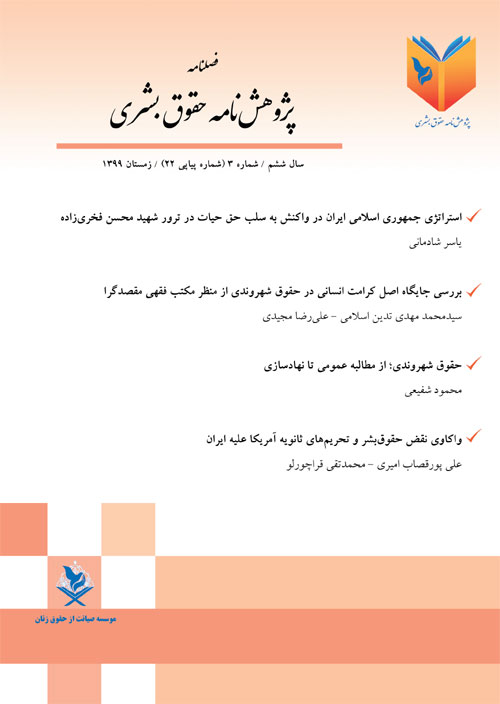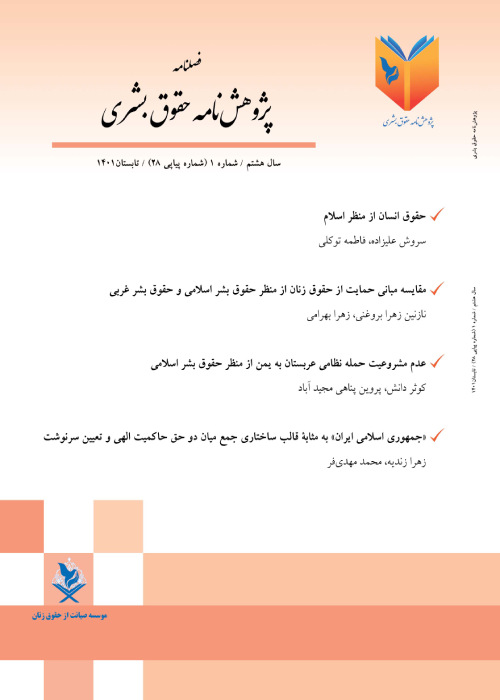فهرست مطالب

نشریه پژوهش نامه حقوق بشری
پیاپی 22 (زمستان 1399)
- بهای روی جلد: 150,000ريال
- تاریخ انتشار: 1399/10/20
- تعداد عناوین: 5
-
صفحه 9
-
صفحه 11
در حالیکه راهکار جامعه بشری در مقابله با تروریسم دولتی، انعقاد کنوانسیونهای متعدد با محوریت تروریسم است، اما ایالات متحده آمریکا و اسراییل با مبادرت به جرایم بینالمللی و اتخاذ راهکارهای غیرقانونی از جمله ترور، امنیت دولتهای رقیب را نشانه گرفته و با اقدامات تروریستی، صلح و امنیت بینالمللی را در معرض خطر قرار دادهاند. ترور دانشمندان هستهای جمهوری اسلامی ایران بهخصوص ترور اخیر محسن فخریزاده (از دانشمندان نخبه کشورمان و مهره اصلی برنامه هستهای ایران)، از جمله این اقدامات است که برخلاف ماده سوم اعلامیه جهانی حقوقبشر است و در قالب تروریسم دولتی آمریکا و اسراییل تعریف میشود. اما آنچه در این میان قابلتوجه است، عدم اراده جدی سازمانها و دادگاههای بینالمللی در راستای مبارزه عملی با تروریسم و سکوت مجامع بینالمللی در مقابل جنایتهای تروریستی آمریکا و رژیم صهیونیستی است که سبب مصونیت دول متخاصم گردیده و آنها را برای ارتکاب اقدامهای تروریستی گستاخ میکند. در این مقاله، نویسنده با بررسی حق حیات و نهی سلب آن در اسلام و قواعد بینالمللی، به این سوال پاسخ میدهد که جمهوری اسلامی ایران در راستای محکومیت عاملان اصلی ترور شهید فخریزاده، بایستی چه راهبردی اتخاذ نماید؟ فرض اساسی این مقاله در پاسخ به سوال اصلی، این است که طرح دعوی در دادگاههای بینالمللی، اقدام متقابل، اشراف اطلاعاتی و مقابله با نفوذ در دستگاههای امنیتی و اطلاعاتی، پیشگیری از جرایم پولشویی، اعمال کیفرهای مالی و تحریم کشورهای حامی تروریسم و ایجاد چالش در حرکتهای تروریستی از طریق وسایل ارتباط جمعی، از مناسبترین راهکارها در این خصوص است.
کلیدواژگان: تروریسم، شهید فخری زاده، استراتژی جمهوری اسلامی ایران، مبارزه با تروریسم، حق حیات -
صفحه 31
حقوق شهروندی، مفهوم نوینی است که در جامعه امروزین از اهمیت بسیار زیادی برخوردار است. اهمیت حقوق شهروندی هنگامی مشخص میشود که بخواهیم راجع به یک جامعه دموکراتیک و مردمسالار گفتوگو کنیم، زیرا لازمه چنین جامعهای، وجود حقوق شهروندی است که جزء لاینفک آن میباشد و شهروندان یک کشور با لحاظ کردن اصل کرامت انسانی، از این حقوق برخوردار میشوند. کرامت انسانی مبنای حقوق شهروندی است که خود به دو قسم کرامت ذاتی و کرامت اکتسابی تقسیم میشود.
در این مقاله نویسنده درصدد پاسخ به این سوال است که آیا کرامت انسانی که به عنوان اصل و پایه حقوق شهروندی دارای اهمیت است، از نظر مکتب فقهی مقصدگرا در دسته ضروریات قرار میگیرد یا خیر؟ بدین منظور در این تحقیق ابتدا مفاهیم بهکار رفته در متن، تعریف شده و با استفاده از آیات و روایات، مورد بررسی قرار گرفته تا زمینه برای بررسی موضوع کرامت به عنوان یکی از ضروریات در مکتب فقهی مقصدگرا فراهم شود و در پایان نیز لزوم رعایت حقوق شهروندی بهمنظور حفظ کرامت انسانی به عنوان ضروری دین، مورد بحث قرار میگیرد.کلیدواژگان: کرامت انسانی، حقوق شهروندی، کرامت ذاتی، ضروریات، شریعت مقاصدی -
حقوق شهروندی؛ از مطالبه عمومی تا نهادسازی / بررسی امکان تشکیل وزارتخانه حقوق شهروندیصفحه 55
مفهوم حقوق شهروندی را باید با توجه به موضوعات کلیتری چون «مطالعه حقهای اجتماعی» و «حقوقبشر» تحلیل کرد و این مقوله به نحو احسن تنها با پشتوانه دولتی محقق میشود. بنابراین با توجه به حساسیت و حمایت نهادهای ترویج حقوقبشر در دهههای اخیر، افزایش ارتباطات افرادی در جامعه جهانی که خواهان تحقق حقوق شهروندی در محیط اجتماعی خود هستند و با عنایت به اهمیت منشور حقوق شهروندی که هم اکنون به عنوان موضوعی مهم در ایران تلقی میگردد، در این نوشتار پیشنهاد ایجاد نهادی برای گسترش فرهنگ حقوق شهروندی و حمایت حقوقی از آن در یک وزارتخانه مجزا تحت عنوان «وزارتخانه حقوق شهروندی» و با عنایت به اصل 133 قانون اساسی مورد بررسی قرار میگیرد. این اعتقاد وجود دارد که برای نهادینه شدن بهتر فرهنگ حقوق شهروندی، نهادی پرثمرتر از وزارتخانه برای تبلیغ و اجرای فرهنگ حقوق شهروندی به نظر نمیرسد، چرا که توسعه و ترویج این مقوله نیازمند راهکارها و روشهای منظم و قانونمند اجرایی است که خود به سازوکارهای اداری و برنامهریزی اساسی نیاز دارد. بنابراین در این مقاله به این سوال پاسخ داده شده که تا چه میزان امکان تشکیل وزارتخانه حقوق شهروندی وجود دارد؟
کلیدواژگان: وزارتخانه، حقوق شهروندی، منشور حقوق شهروندی، قانون اساسی، دولت -
صفحه 75
ایران در دهههای اخیر با چندین تحریم منطقهای و بینالمللی در تجارت خارجی، خدمات مالی و بانکی روبرو بوده است، اما تحریمهای ثانویه آمریکا علیه شرکتها و به طور خاص در بخش مالی - تجاری، به صورت محسوسی بر رفتار آنها تاثیرگذار است و آنها را اجبار به انطباق با سیاستهای خود مینماید تا حاشیه امنی از ضررهای مالی ناشی از اقدامات تنبیهی ایجاد کند. تحریمهای آمریکا بر اساس رویکرد تجارتمحور است که تاثیر آن از رویکرد دولتمحور بیشتر و موثرتر میباشد. تحریمها همواره مانند اهرمهای فشار به نحو مستقیم یا غیرمستقیم بر کشورهای هدف اعمال میشوند که در بردارنده نتایج متعدد و مختلفی هستند. اجبار، عملکرد اصلی تحریمها است. با توجه به اینکه تاثیر تحریمهای ثانویه موجب نقض حقوقبشر میگردد، پرسش اصلی در این پژوهش این است که آیا تحریمهای ثانویه و جریمههای اعمال شده توسط قانونگذاران ایالات متحده (اغلب از سوی وزارت خزانهداری آمریکا) که موجب تغییر رفتار و کسب و کار میشود تا با خواستههای ایالات متحده هماهنگ باشد، تاثیری بر حقوقبشر مردم ایران دارد؟
کلیدواژگان: حقوق بینالملل، تحریم، تحریم های ثانویه، نقض حقوق بشر
-
Page 11
The solution for human society is to conclude dozens of conventions centered on terrorism in order to counter state terrorism; but the United States and Israel have targeted the security of rival governments by committing international and illegal crimes through terrorism. The assassination of nuclear scientists, especially Dr. Mohsen Fakhrizadeh, has been defined as US and Israeli state terrorism and is contrary to Article 3 of the Universal Declaration of Human Rights. The unwillingness of international organizations and courts to fight terrorism has led to the immunity of hostile states. In this article, the author examines the right to life and the prohibition of its deprivation in Islam and international rules to answer the question that what strategy should the Islamic Republic of Iran adopt to condemn the main perpetrators of the assassination of Martyr Fakhrizadeh? The basic hypothesis of this article in answer to the main question is that litigation in international courts, reciprocal action, information dominance and countering intrusion into security and intelligence devices, Prevention of money laundering offenses, imposition of financial penalties and sanctions on countries that support terrorism and challenging terrorist movements with the mass media are the most appropriate solutions.
Keywords: Terrorism, Dr. Fakhrizadeh, Islamic Republic of Iran, Countering Terrorism, The right to life -
Page 31
Citizenship rights are a new concept that is very important today. The importance of citizenship rights becomes clear when we want to talk about a democratic society. Because the requirement of such a society is respect for civil rights and is an integral part of it. The citizens of a country enjoy these rights, taking into account the principle of human dignity. Human dignity is the basis of civil rights, which in itself is divided into two types: intrinsic dignity and acquired dignity. So the author in this article answers the question that is human dignity, which is the basis of citizenship rights, necessity according to the school of jurisprudence or not? Therefore, in this research, the concepts used in the text is defined and examined by verses and narrations to provide a basis for examining dignity as one of the necessities in the destination-oriented jurisprudence. Finally, the need to respect citizenship rights to preserve human dignity as a necessity of religion is discussed.
Keywords: Human dignity, civil rights, inherent dignity, necessities, intentional law -
Page 55
The concept of citizenship rights should be analyzed in terms of more general issues such as the “study of social rights” and “human rights” and this can only be achieved with government support. Therefore, given the sensitivity and support of human rights promotion institutions in recent decades, increasing communication between people in the international community who want to realize their citizenship rights in their social environment, considering the importance of the Charter of Citizenship Rights, which is currently considered an important issue in Iran. In this article, suggesting the creation of an organization to spread the culture of citizenship rights and legal protection in a separate ministry called the “Ministry of Citizenship” with regard to Article 133 of the constitution is examined. Therefore, this article answers the question that what is the possibility of forming a Ministry of Citizenship Rights? It is believed that in order to better institutionalize the culture of citizenship rights and to promote and implement a culture of civil rights; there is no institution more useful than the ministry. Because its development and promotion needs regular and lawful executive strategies and methods, which requires basic administrative mechanisms and planning.
Keywords: Ministry, Citizenship Rights, Charter of CitizenshipRights, Constitution, Government -
Page 75
In recent decades, Iran has faced several regional and international sanctions on foreign trade, financial services and banking; but US secondary sanctions against companies, particularly the commercial finance sector, significantly affect their behavior. It forces them to comply with their policies in order to avoid the financial losses resulting from punitive measures. US sanctions are based on a trade-oriented approach, which is more effective than the government-centered approach. Sanctions, like levers of pressure, are always applied directly or indirectly to target countries, which have many different consequences. Coercion is the main function of sanctions. The impact of secondary sanctions violates fundamental human rights. The main question in this research is: Do secondary sanctions and penalties imposed by the United States, which changes behavior and business that aligns with US demands (Mostly from the US Treasury Department) affect the human rights of the Iranian people?
Keywords: International law, sanctions, secondary sanctions, humanrights violations


